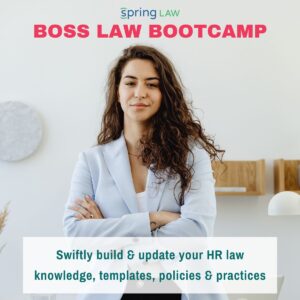New Boss Law Bootcamp
 Hello Friends of SpringLaw!
Hello Friends of SpringLaw!
We hope your summer has gone well!
For many of our employer clients, it’s time to get back to business, solidify HR law systems and post-pandemic norms and to gear up for a busy fall.
We want to make that easy for you – we’re excited to announce the launch of our new Boss Law Bootcamp. This comprehensive online program is designed for both new employers not sure where to start as well as boss pros who all need to keep their legal templates and resources up to date.
The Bootcamp includes the up-to-date core HR law contracts and policies you must have in place today, plus bonus guides & checklists AND time with our employment lawyers to customize and help you with the how of implementing the legal infrastructure. We want this to be effortless and quick for you.
And we have an Early Bird price until Sept 15!







